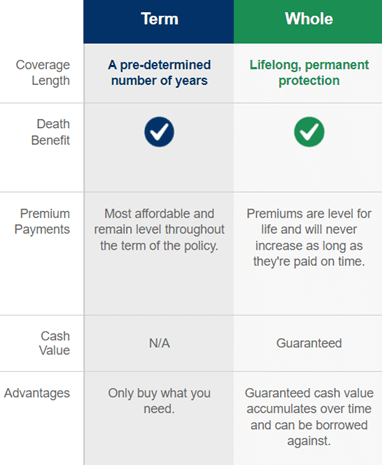Shop At Haya: Your Ultimate Shopping Guide
Discover the best shopping tips, trends, and deals for a smarter buying experience.
Whole Life Insurance: The Time Capsule You Didn't Know You Needed
Unlock the surprising benefits of whole life insurance—your financial time capsule for securing a brighter future!
Understanding Whole Life Insurance: A Comprehensive Guide
Whole life insurance is a type of permanent life insurance that provides coverage for the entirety of an individual's life, as long as premiums are paid. Unlike term life insurance, which only offers protection for a specified period, whole life policies accumulate cash value over time, making them an attractive financial tool. This cash value can be borrowed against or withdrawn, providing policyholders with additional financial flexibility. The premiums are generally higher than term life premiums but remain level throughout the life of the policy, offering predictability in financial planning.
When considering whole life insurance, it's essential to understand the key components that affect your decision. Here are some important factors to consider:
- Premiums: Whole life premiums can vary based on factors such as age, health, and the coverage amount.
- Cash Value: Whole life insurance policies build cash value at a guaranteed rate, which can be accessed by the policyholder.
- Dividends: Many whole life policies pay dividends, which can enhance the policy's cash value, although dividends are not guaranteed.
Understanding these elements will help you determine if whole life insurance aligns with your financial goals and long-term planning.

Is Whole Life Insurance Right for You? Key Factors to Consider
Whole life insurance can be a valuable financial tool for many individuals, but deciding if it's right for you requires careful consideration of several key factors. First, assess your long-term financial goals. If you're looking for lifelong coverage that builds cash value, whole life insurance may align with your objectives. It's essential to evaluate how this product fits within your overall financial plan, including aspects like savings, retirement, and estate planning.
Additionally, consider your budget and how a whole life insurance policy fits into your monthly expenses. Whole life insurance typically has higher premiums compared to term life insurance, so it's crucial to ensure that you can sustain the payments in the long run. Reflect on your family’s needs, your current financial situation, and whether the benefits, such as guaranteed death benefits and cash value accumulation, justify the investment. By considering these factors, you can make a more informed decision about whether whole life insurance is the right choice for you.
The Unique Benefits of Whole Life Insurance: More Than Just a Safety Net
Whole life insurance offers numerous benefits that extend beyond its primary function as a safety net. Unlike term life policies, whole life insurance provides lifelong coverage, ensuring that your loved ones remain financially secure regardless of when a claim is made. Additionally, whole life insurance accumulates cash value over time, serving as a potential resource for loans or withdrawals. This aspect can be incredibly useful for unexpected expenses or significant life events, making it a versatile financial tool that complements traditional savings and investment plans.
Moreover, whole life insurance has predictable premiums that remain constant throughout the policyholder's life, providing financial stability and making it easier to budget for. The policy's death benefit is generally tax-free, offering heirs valuable financial relief during a difficult time. As an investment vehicle, whole life insurance can also participate in dividends, leading to increased cash value and a larger death benefit. Overall, the unique benefits of whole life insurance make it not just a policy for peace of mind, but a strategic element of comprehensive financial planning.